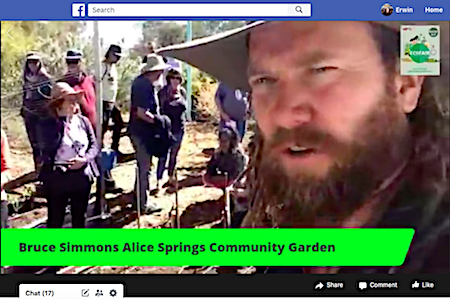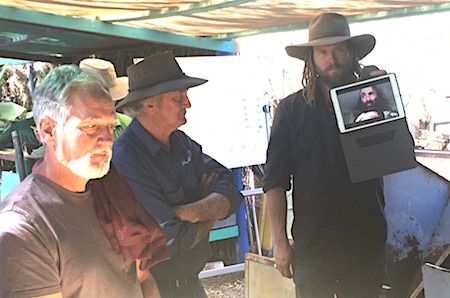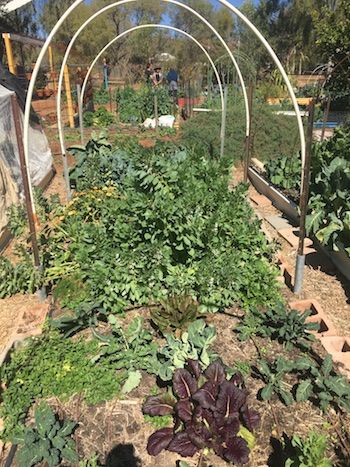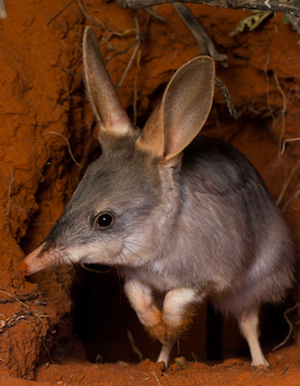Big national EcoFair audience a winner for Alice
11 August 2020
By ERWIN CHLANDA
Best guess, how many people would you expect to enjoy a tour of the community garden in Burke Street, on a sunny winter’s Sunday? Fifty? Sixty?
Try 9000, from all around Australia – and rising.
The tragic pandemic has its upsides, and this is one of them: When the Arid Lands Environment Centre got into top gear in March preparing its 12th EcoFair the Coronavirus had struck.
But rather than cancelling the event, as many others were doing, ALEC decided on an online-only function and started a crash program to learn how to do it.
“Extra forms, extra paper work,” says CEO Jimmy Cocking (pictured above, streamed to more than 9000 people): “It’s not just a matter of downloading an app and it’s going to work. We had to do webinars to learn how to use the webinar functions of Zoom, and so on.”
ALEC engaged Costa Georgiadis (pictured below), from the ABC’s Gardening Australia, the regular star of the event, to appear online this time.
But when some COVID restrictions were recently eased the ALEC staff and volunteers embarked on cramming for a second subject: How do you cope with the reams of rules for live events – social distancing, contact tracing, limits on numbers and so on?
They took it all on board, and implemented it in an efficient but friendly manner from Friday to Sunday. And the town was rewarded with a superb three-day program that could be consumed ‘in real life’ or online.
This climaxed in the Sunday garden tour that gave the town some national exposure that only a lot of money could buy: Local garden guru Geoff Miers, untiring community garden worker Bruce Simmons and Mr Cocking – the roving cameraman, producer, on-the-run editor for the one hour and 45 minutes show – became online stars across the nation, on the Costa Georgiadis Official Facebook site.
Now the fair could be enjoyed via Zoom, Facebook Live, streamed, on an 8CCC live broadcast and Facebook.
 Although some COVID attendance restrictions had to be applied, locals got a first-hand experience of Alice at its best, with a dozen or so members at the garden providing food including wood-fired pizzas.
Although some COVID attendance restrictions had to be applied, locals got a first-hand experience of Alice at its best, with a dozen or so members at the garden providing food including wood-fired pizzas.
Pictured (from left): Community garden helper Peter Ammizboll, Geoff Miers and Jimmy Cocking holding the computer used in the Zoom session, with Costa Georgiadis on the screen.
The “Hemp Territory – green opportunities for the NT” session yielded similar opportunities and savings.
Presenters from Queensland, Tasmania, NSW and Darwin joined in: The cost of bringing them to Alice Springs in the flesh would have been thousands of dollars.
“This year was about producing content, producing knowledge that could be shared, and that continues to be shared,” says Mr Cocking.
“The value to have something for posterity, rather than just having the moment, building the knowledge system and sharing it, is in the content that will be online in perpetuity.”
The fair gets financial support from the Federal and NT governments and the Town Council.
The garden started in 2010 and has now 50 plots. People can also use the community plot while Food for Alice sells produce from the garden.
The garden program was under the motto “growing food in Alice” which raised the question: Do we have enough water?
Mr Cocking, speaking to the News after the fair, says we’re not using it very productively, on lawns, and there are a lot of leaks.
Should the town effluent – now dealt with in sewerage ponds that send water pumped from the Alice Springs aquifers via evaporation to far-away places – be recycled?
“Of course,” says Mr Cocking.
How much more food could the town produce with water from recycled sewage?
There are no numbers about that but “there needs to be investment so we’re not wasting it”.
He says the Alice Water Smart program was funded for two years. It “informed” the Darwin Living Smart program which the NT Government-owned Power Water Corporation has funded for the last seven years.
“It needs to be government funded and Power Water needs to be working in that space,” says Mr Cocking.
“They are doing it in other parts, there are water conservation programs happening in communities but not in Alice Springs where Water Smart generated all this knowledge but it hasn’t been followed up.
“It’s not up to small, unfunded community groups to do this off their own bat. This is a societal issue.”
Mr Cocking says he may have more leverage now as the newly appointed deputy mayor but “demand management is a Territory issue.
“What the pandemic is showing all of us is how reliant we are on things being transported to us, whether it’s internet shopping – “look at the lines at the post office” – but for food as well.
 The town used to be largely self reliant on locally grown food: “The people involved in this garden are seeing the writing on the wall.”
The town used to be largely self reliant on locally grown food: “The people involved in this garden are seeing the writing on the wall.”
Mr Cocking says there are negotiations about setting up a second community garden in the grounds of the Middle School in Gillen.
The Water Advisory Committee will be reconvening and there is a review of the water allocation plan coming up in the next 12 months, says Mr Cocking.
There had been lobbying to get rid of the cap on extraction, supported by the Town Council at the time, “which ultimately has led to there being no investment in water conservation work since.
“It’s been de-prioritised. No longer is there a statutory plan to reduce water use, to conserve water.”
The land councils are calling for a safe public water drinking act.
“Ultimately we are mining our water so unless we come up with some magical way of making water there is no simple fix.
“That’s the challenge of a hydrogen driven economy that is using a lot of water.”
A documentary included in the retrospective of works by film maker David Nixon, who passed away earlier this year, dealt with the Ten Deserts program initiated by ALEC with a $21m donation from the BHP Foundation.
Mr Cocking says it is a time-limited project to support or deal with Indigenous land management, to help set up protected areas, fire management, “rangers coming together which is building cohesion and trust,” feral camels, inappropriate fire regimes.
 One current project is producing an animated series on buffel grass in Pitjantjatjara language.
One current project is producing an animated series on buffel grass in Pitjantjatjara language.
“ALEC was part of starting this. We came up with the name Ten Deserts. I personally helped pulling all these partners together between 2013 and 2016.”
The Nixon documentary showed early efforts to protect bilbies (like the one at right), and a national gathering in the hugely remote Kiwirrkurra community, across the WA border.
More recently, during aerial fire fighting “one of the elders in the helicopter could see bilby tracks and so they were bilby tracking from helicopters,” says Mr Cocking.
Where will Ten Deserts go from here?
“There is always a challenge of getting something to scale without losing the intent,” says Mr Cocking.
“You get something bigger and you create a bureaucracy, all these different levels. A this point Ten Deserts is largely focussed on rangers and supporting land management. But ALEC advocates within that space for a lot more action on climate change.”
That includes issues of housing “on country” where people are “happier, healthier, connected to country, connecting the kids to country and keeping culture strong [but also ensuring] that people are living sustainably out there, have sustainable livelihoods.”
That final point seems be very much to be a work still in progress – but time may be running out: “In 20 years’ time it may be too hot out here for a lot of that stuff.”



Alice Springs’ strength lies with its many remarkable citizens, people like Jimmy Cocking and the membership of the Arid Lands Environmental Centre and organisations like Community Gardens, all of which contribute to an emerging community culture that should be valued and nurtured by governments at all levels, for they hold the key to the town’s survival as we march towards an uncertain future. More strength to them.